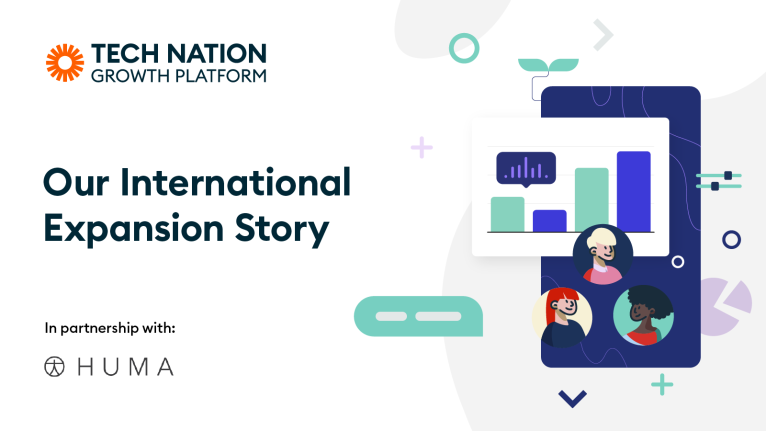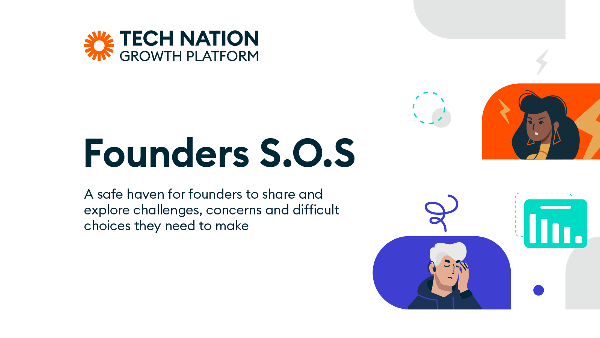Our International Expansion Story: Aida Yousefi from Huma

Lorem ipsum dolor sit aet, consectetur adipiscing elit, sed do eiusmod tempor incididunt ut labore et dolore magna aliqua. Ut enim ad minim veniam.
Since it was founded in London in 2011, healthtech company Huma has gone on a journey of incredible success and growth. Having raised £250m so far, they currently operate in four continents and over 20 different countries.
Aida Yousefi has over 20 years experience in healthcare, and joined Huma in March 2020; spearheading the company’s growth into several territories at an absolutely vital time, when remote healthcare became a global necessity.
We spoke to Aida to learn more about Huma’s international expansion journey.
Acting fast
“I joined Huma at the start of the pandemic and lockdown. We were reaching out globally to provide our COVID solution not for profit and, in some cases, fully for free, to aid people to be safely looked after using our remote patient monitoring platform. It was through this mechanism that we entered into the German market.
Although Huma already had a presence in the USA and China, many of the other geographies we sit in came about off the back of reaching out through our partners, as well as directly to nations that were really struggling to cope with the demands of COVID and the influx of patients into their emergency units.We were able to deploy at scale and with speed in the UK and Germany and had shown to have made an impactful difference, and through that we had showcased what was possible, and how we could help other nations.
We started sharing our learnings with many people around the globe. They were in varied stages of digital maturity, and some were in a position to accept and go forward with the solution. We expanded into UAE, India and Wales. There wasn't too much planning on our expansion, instead we were responding to a timely problem, and the needs of each of the health and Life Science systems we were speaking with.
Why did Huma expand? To improve peoples’ lives
"I think the key thing to prepare for when looking to expand internationally is to determine your objective. Why are you wanting to expand internationally? What are you not getting in the environment you're already in? What is the need for you to expand internationally?
From our perspective, we wanted impact and reach at scale. We were in the middle of a pandemic, we had a solution that works, and we wanted to share our learnings and allow people around the world who were in need to also benefit.Our key initiative was to help as many people as we possibly could. And as our results have shown, we really did make a positive and impactful difference.
You might want to go into a new market for a new revenue stream, or because you want to test the waters. You might feel there is a need or an objective that needs to be reached. Or maybe there’s a problem you think you can solve in that region. It might simply be because you're unable to achieve what you want in your home environment.
I suggest a careful look at the economics behind it. If it's from a financial perspective, you prepare very differently to if it's from a missionary perspective.
Expanding internationally isn’t an easy thing to do and there are many considerations that can be costly, so sometimes doubling down at home may be a better solution.
Be prepared before you go in
"If I was to give advice to someone expanding internationally, what I would say would differ tremendously depending on the region - as they are so very different.
When we look at digital solutions, you need to understand if the new market you're expanding into is ready for that sort of digital solution.
The US is kind of a world of its own, and understanding what your competitive landscape looks like is very important. Understanding who would be your champion in that market is also really key. It's a big market, and each of the states act as different countries. So the US requires its own thinking altogether.
Different, smaller countries, such as Germany, or other European countries are specific to the particular country. Germany is hugely regulated, especially in healthtech, so there will be a lot of work that needs to be done around ensuring you tick all the correct boxes.
You can’t do everything yourself
"It’s really important to realise at the outset that you can't do everything yourself. Think who would be the best people to partner with, or contract with that would set you up for the most success.
When we entered into the German market, we signed up with the health minister, so there was absolutely no option to fall short on delivering what we promised. We went in headfirst and I'm pleased to say that we managed to do what we signed up to do.
But Germany is a first world country, it’s economically stable, regulated, and so it’s a safe environment. When you start looking at Sub Saharan Africa, Brazil, the Middle East, it’s vital you understand which countries can provide the return that you need.
You don’t know what you don’t know
"You need to be really cautious and do your homework on what you don't know. One of the biggest lessons I learned is that you don't know what you don't know. And it's really important that you find that out.
Any new region you’re planning to enter, speak to people that have gone in there and ask for all the ins and outs of why not and why to, and be prepared for that prior to making that decision to go in.Some will win and some will not
"Because of the pandemic, we were expanding internationally with our mission to provide a timely and life-saving solution, it was a very particular scenario. Would I do something differently now? I probably wouldn't. I think we did really well in doing what we did.
However, there's always lessons to be learned; we didn't always win, but when you go out there with open hands with solutions during such a crisis, I think you need to be prepared for the fact that some will win and some will not. But what does winning mean in a scenario like that?
There were definitely some internal lessons we learned amidst the chaos. I would agree on what success looked like for us. I would make sure we all agreed that going live and helping X number of lives is a success in itself. Our initial mission was to provide these solutions, and any life touched positively through our solution is a success. If the company’s all agreed on that, that's fantastic.
Think about what happens afterwards
"If you're looking at a long-term international market expansion plan, you should also think about what you want to happen after that. After you've had this impact, or after you've landed in an environment, what do you want to add to that region? What does success look like? Agreeing that is key.
In our case, it was easy because we had patients at the centre of everything we were looking to do and achieve. This was a shared objective with any partner we went into market with.
If a partner’s motivation was purely financial, or for any other reason, then we knew we weren't with the right partner. So it was easy to establish whether we were heading in the right direction or not. There were many things that we didn't go into, said no to and didn't pursue, purely because that shared objective and value wasn't there.
Having everyone agree and on the same page means you can set milestones and people in place to ensure you reach that objective and success.
Choose your partners wisely
"I always suggest you go in with partners into foreign markets, but ensure they share your objectives for success. Agree on what success looks like, and you're both driven to a win-win situation.
We're in the tech industry, and much of the information we collect ends up in big clouds. Many cloud companies and consultancy companies are global too.
Consultancies can have some great opinions and insights about what's going on technologically in different regions, as well as interesting stats on lives - age, risk, prevention for example. So you might need a cloud computing partner and a consultancy partner, but it’s key to look at partners that have relevance to what you do.
Being in healthtech, it’s super important to have validation that something is safe, so for us it was key to have academic partners. Academia helped tremendously. Academic partners can very honestly and objectively give you the stats and information needed to make your decisions.
Of course, bear in mind that they may have their own incentives, wants, and needs, so take their advice with that in mind.
If you can find a partner where you both win if you get it right, that's the right partner.
Agree on what growth means
"When I first started at Huma there was a massive focus on growth. Growth can mean many things; growth in new markets can mean many things. It could be growth and expansion of your product offering in the current markets, or into new markets and new geographies. Companies at different stages will be ready for different things.
Consider the size of your company at that particular stage. Once you've hit a few core regions, do you actually want to go to any new ones? Or do you want to make an impact and expand in the areas you've landed in.If you're in a position where your company needs to grow, sit down and decide how you want to grow it. If you want to hit particular numbers, how do you foresee hitting those numbers? Is it ensuring you build on the contracts you have with certain partners? Or is it brand-new stuff? Is it expanding your offering to win new clients? And are they in the same market?
Create a growth team
"I think it’s really important to dedicate a select team to growth. Growth in new markets requires a lot more infrastructure and staffing support than general company growth. Your HQ can only do so much when you go into a new country with new regulations, a different language and requirements, and that requires face-to-face meetings. You need a dedicated team to make that a success.
Have a team that explores these new markets for you and feeds back. Develop a structured mechanism that may be different for different markets. It ultimately comes down to the cost: What would be your ROI? And very importantly, what's the opportunity cost? Evaluate some of those things, discuss them internally and with your leadership team, and get some advice on how you get the most value.How are you going to achieve the values or the OKRs that you've set for the company? Are you going to focus on the number of people, geographies, lives improved? Or is it about the number of deals, clients, and how much revenue?
Having a separate growth team will be key for building your growth agenda, as you are dedicating time and resources to it. It’s going to be an investment that may have an exceptional return. They may decide it wouldn't have a return, and that your domestic market is where you're going to focus because they've identified the risks. Maybe you aren’t ready, but you'll be ready in two years. Whatever they discover will have value and place you in a good position. It's never wasted.
Having a dedicated team for growth means the heart of your company carries on as your going concern. It's not impacted, influenced or disrupted and continues to deliver the revenues you need.
International expansion is inorganic growth
"Startups are opportunistic. Things come your way and you grab them and run with it. Putting structure around your growth strategy is really important. There should be a company strategy, and then there should be a separate growth strategy.
You need to differentiate these two things when you're on a growth agenda, because you've got organic growth that's going to carry on, and then there’s inorganic growth.
In conclusion
"International expansion has the potential to double your growth or it could completely implode and suck all the energy out of your system, so have a separate and very focused strategy on what your growth agenda looks like.
It's really important you realise you can't do everything and you have to be a bit choosy. You need some friends, and some partners you can trust and work with, that can give you honest opinions and advice, and to double check yourself because you don't know what you don't know".


